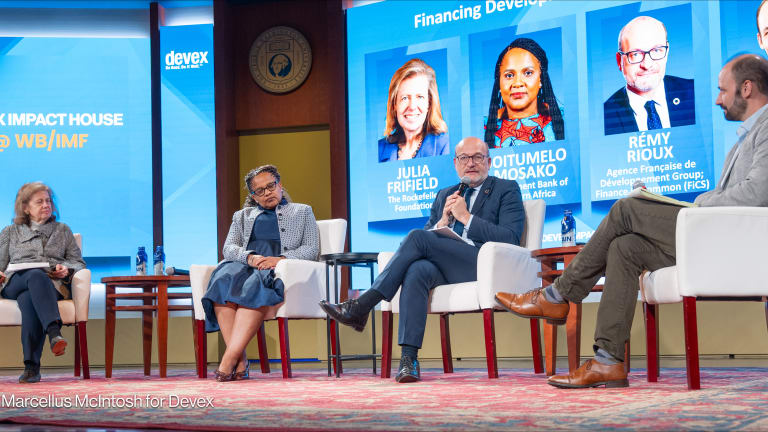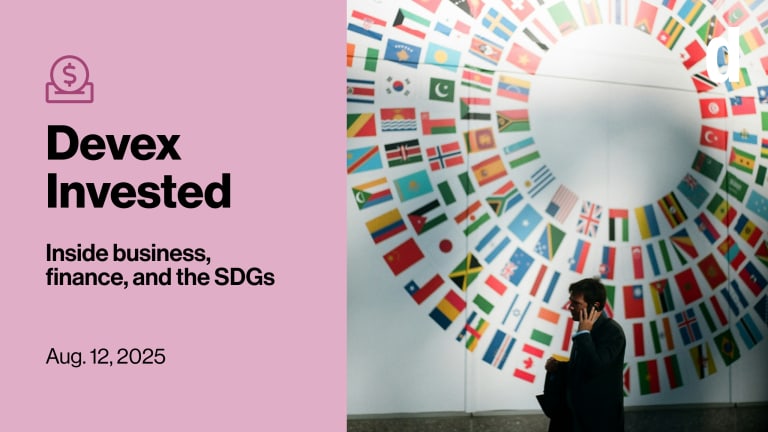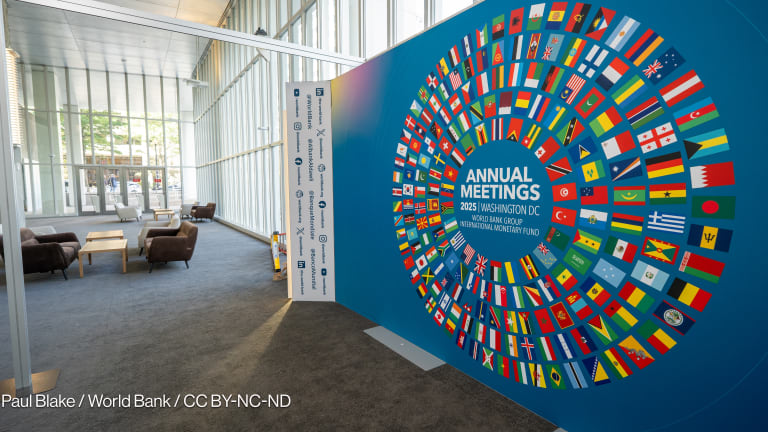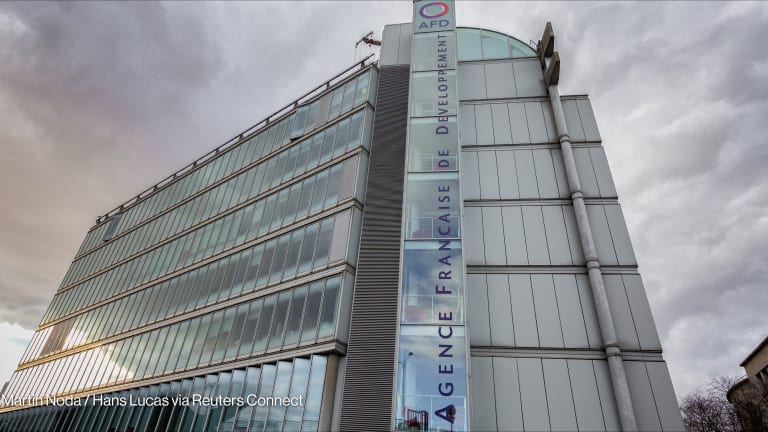Q&A: AFD chief on the future of European development finance
We don't need a "World Bank of Europe," says French Development Agency Director-General Rémy Rioux.
PARIS — The director-general of the French Development Agency Rémy Rioux, says his new book is an attempt to breathe new life into development cooperation — a sector that “we love” but which needs a “coup de jeune,” or a “shot in the arm.” “Réconciliations,” out in English in September, is partly a riposte to the United States’ new aid strategy. For aid watchers in the European Union, however, it is also a useful guide to what one of its major players thinks should happen next. It comes as the European Bank for Reconstruction and Development looks to press further into Africa, and the European Commission and European Investment Bank — mooted as a future climate bank by the commission’s next potential leader — struggle for control of EU investments abroad. “EBRD … has largely achieved its mission since [the former Soviet states in Eastern Europe] adopted market economies and democratic principles,” Rioux writes. “The EIB, by contrast, is essentially an investment bank in infrastructure. A rapprochement of these two institutions to create a single development institution would make a lot of sense. On the condition that the new entity did not try to become a ‘World Bank of Europe’, but instead served as the glue between and in the service of development institutions of [EU] member states...” If European development actors are to achieve their combined potential, Rioux, who also chairs the International Development Finance Club, writes that “it is indispensable that each member state build their own development institution.” “With AIDS, if you were careful you could avoid it, [with] climate change you can’t.” --— Rémy Rioux, director-general, French Development Agency When he met last month with a group of experts charged with providing options to EU leaders by October on how to reform their development institutions, the Frenchman showed slides illustrating how EU member states’ financial institutions dwarf EBRD and EIB when it comes to both their financial commitments outside the EU, and the number of staff and offices abroad. Rioux writes that a development agency per member state is also necessary, “to avoid an excessive centralization of cooperation action in Brussels or Luxembourg, far from European citizens, at the exact time it’s necessary to convince them that this policy and what is at stake concerns them.” Europeans citizens’ engagement with development is an issue that clearly bothers Rioux, and it is where he began a recent discussion with Devex in his Paris office. This conversation has been edited for length and clarity. If you could choose one person to read this book, who would it be and why? The French citizen. Eighty percent of people in France think development concerns them in their daily life and they support these actions; and you have 80% — the same people no doubt — who say no one talks to us about this. People think we have no capacity for action. In the past we had AIDS [as a development cause that people were concerned about affecting their daily lives], now we have climate change. And it’s even more powerful, because with AIDS, if you were careful you could avoid it, climate change you can’t. So people have a terrible anguish, added to economic globalization, and they have the impression we can’t do anything. All we tell them are things from the past, words from the past. You mention in your book that each EU member state should have a development institution, that Hungary is envisaging creating a development agency, and that AFD wants to help them in this. I love the EU. But if we put all our forces in Brussels or Luxembourg or London or Paris, at some point it becomes very dangerous. Because at that moment you become a target for all those who want to target [development] policy. It’s necessary to have someone in Budapest who writes a book and who goes on television to explain what’s happening in Africa, and elsewhere. If someone in Budapest goes on television that person will likely say that development is all about stopping migration from Africa. Yes, fine. If there is one thing that Europeans all agree on it is that we must invest in Africa. They don’t agree for the same reasons. In Budapest, it’s probably because they don’t want to see Africans in Hungary. Fine. In France, it’s not that. In France, it’s more the opposite. But the result is the same. The only difference between some of us and the others is what we are doing. Do you invest in Africa? That’s what I want to go and say to the Hungarians and Poles — I don’t target the Eastern countries particularly. It’s necessary to tell them: Be consistent. If you say that we need to invest in Africa because there’s a risk or an opportunity, then do it, and we at the AFD are ready to work with you. What do you make of the EBRD’s potential move further south into Africa? If it’s just to have one more player who comes to compete with everyone else on the same deals, it’s not interesting. If it’s in a logic of cooperation and if it’s helping the others go and seek more risk — which the EBRD knows how to do pretty well with the private sector — then, why not? We have a World Bank, it’s very good, we like it a lot, but we don’t need umpteen World Banks. And we certainly don’t need two World Banks in Europe. I would like these institutions to transform themselves and serve as the glue in the European system so that they help the EU member states do more internationally. What about the idea — proposed by German development minister Gerd Müller and in a French parliamentary report — of a commissioner for Africa in the next European Commission? There’s a question over how does that work with the high representative for foreign policy? How does it work if there is still a development commissioner? How does an Africa commissioner fit in? If Africa is a major strategic subject for Europe, we should probably have a European commissioner for Africa with clout. We need quality people who have political weight. If this discussion is happening, it’s because everyone has understood it’s a big priority for Europe — what form that takes goes beyond my role. You write about reconciling the three Ds — development, diplomacy, and defense. How do you reconcile development and defence when France continues to sell arms to Saudi Arabia — despite recent media reports that these are used against civilians in the conflict in Yemen? For me, defense is what allows you to separate the fighting parties; diplomacy allows for pacification, to create a framework for the actors to buy into; and development is what nourishes the framework, creates reconciliation and projects these solutions for the medium and long term. We’ve understood that, particularly in the Sahel, with the Sahel Alliance. In the Arab peninsula we aren’t there, obviously. AFD doesn’t work in Yemen. We had a mandate in the past but we never did much. So we don’t have a voice in this debate. But what you’re saying is that there is a question of coherence in public policies. The “3 Ds” is a call to explore the coherence of state action while giving more emphasis to development policy. There are areas where we manage because we’re strong. There are others where we are more marginal and peripheral, against actors in diplomacy and defense who are very powerful in France, obviously.
PARIS — The director-general of the French Development Agency Rémy Rioux, says his new book is an attempt to breathe new life into development cooperation — a sector that “we love” but which needs a “coup de jeune,” or a “shot in the arm.”
“Réconciliations,” out in English in September, is partly a riposte to the United States’ new aid strategy. For aid watchers in the European Union, however, it is also a useful guide to what one of its major players thinks should happen next. It comes as the European Bank for Reconstruction and Development looks to press further into Africa, and the European Commission and European Investment Bank — mooted as a future climate bank by the commission’s next potential leader — struggle for control of EU investments abroad.
“EBRD … has largely achieved its mission since [the former Soviet states in Eastern Europe] adopted market economies and democratic principles,” Rioux writes. “The EIB, by contrast, is essentially an investment bank in infrastructure. A rapprochement of these two institutions to create a single development institution would make a lot of sense. On the condition that the new entity did not try to become a ‘World Bank of Europe’, but instead served as the glue between and in the service of development institutions of [EU] member states...”
This story is forDevex Promembers
Unlock this story now with a 15-day free trial of Devex Pro.
With a Devex Pro subscription you'll get access to deeper analysis and exclusive insights from our reporters and analysts.
Start my free trialRequest a group subscription Printing articles to share with others is a breach of our terms and conditions and copyright policy. Please use the sharing options on the left side of the article. Devex Pro members may share up to 10 articles per month using the Pro share tool ( ).
Vince Chadwick is a contributing reporter at Devex. A law graduate from Melbourne, Australia, he was social affairs reporter for The Age newspaper, before covering breaking news, the arts, and public policy across Europe, including as a reporter and editor at POLITICO Europe. He was long-listed for International Journalist of the Year at the 2023 One World Media Awards.








